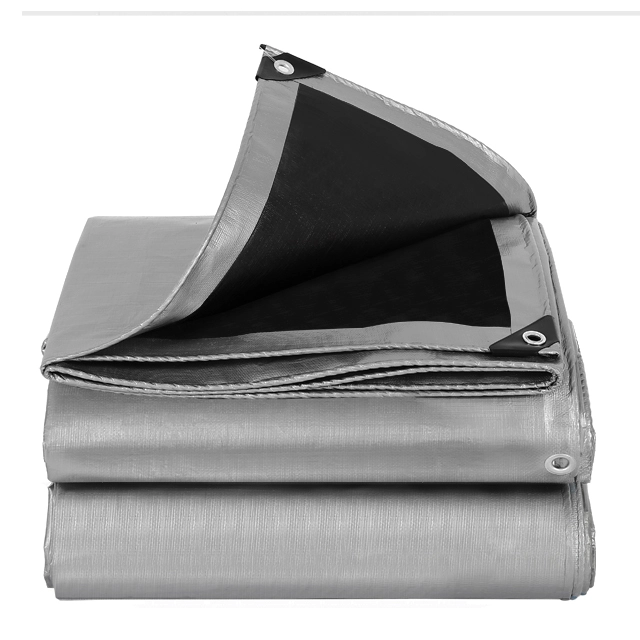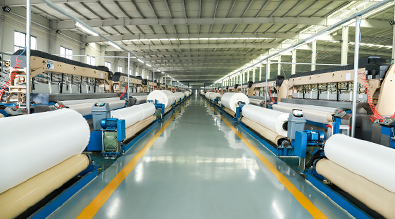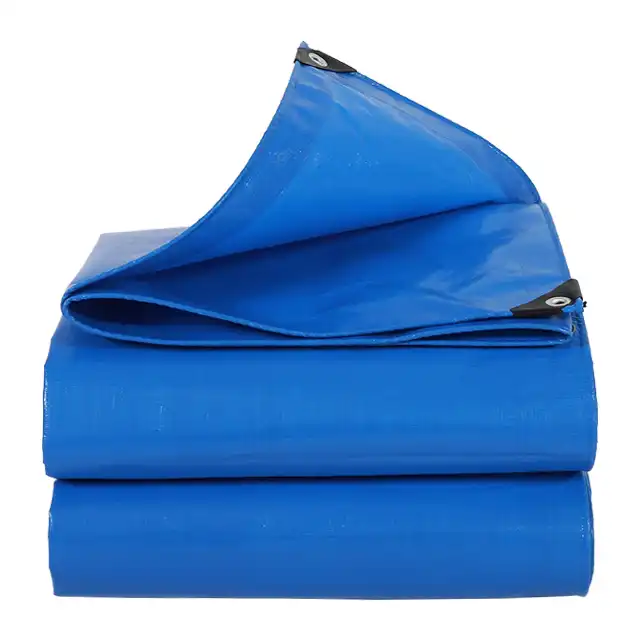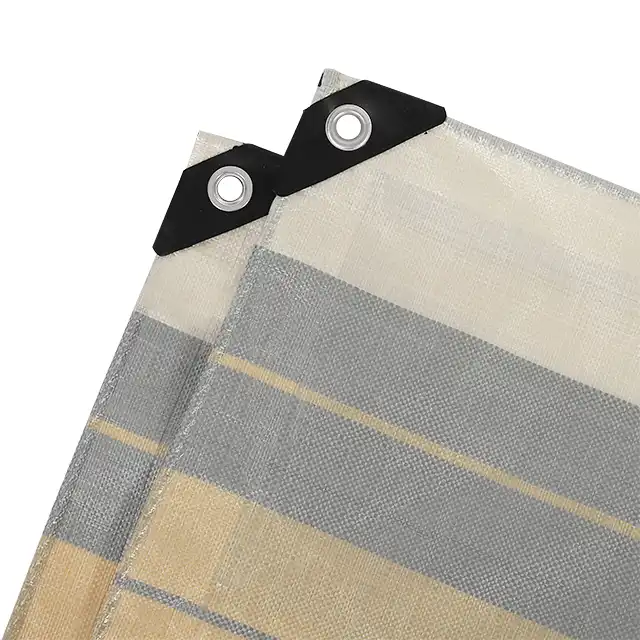PE tarps are recyclable, making them an ecologically dependable choice for businesses and customers looking for economical defensive covering arrangements. Polyethylene coverings can be prepared through specialized reusing offices that handle plastic polymers, where they are cleaned, destroyed, and changed into unused polyethylene items. The recyclability of these strong covers depends on appropriate planning, counting careful cleaning and expulsion of any metal grommets or rope connections some time recently handling. Understanding the natural benefits of choosing recyclable polyethylene materials makes a difference organizations diminish their biological impression whereas keeping up the remarkable assurance and solidness these items give.
Understanding PE Tarps
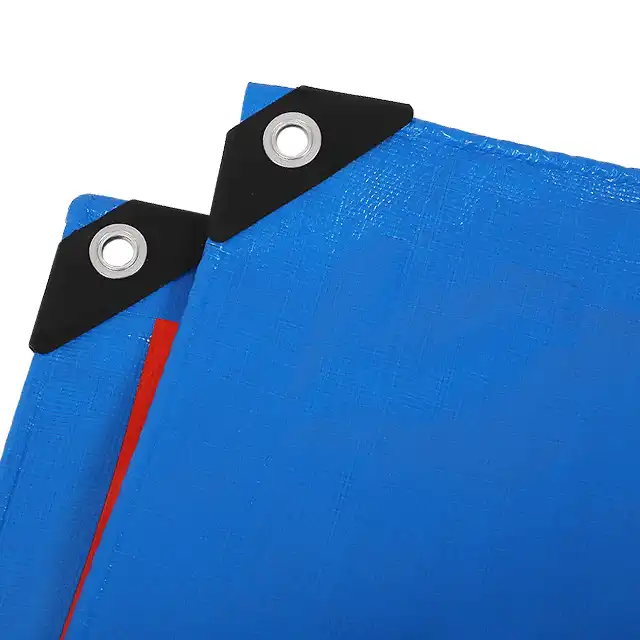
What Are PE Tarps?
PE tarps, or polyethylene tarps, represent versatile protective coverings engineered from high-density polyethylene fibers that are meticulously woven into durable fabric and laminated on both sides for enhanced protection. These coverings serve multiple purposes across construction sites, agricultural operations, and outdoor events where reliable weather resistance remains paramount. Understanding the fundamental characteristics of polyethylene tarpaulins enables informed decision-making when selecting appropriate protective solutions for specific applications. Shengde's SENDOW TARPAULIN products exemplify superior craftsmanship, utilizing HDPE woven fabric with LDPE coating to create exceptionally durable protective coverings. Our manufacturing process incorporates high-strength yarn treated with UV protection to prevent degradation from harmful solar radiation and color fading. The tightly woven polyethylene construction ensures long-lasting performance across diverse environmental conditions.
Benefits of PE Tarps
Polyethylene tarpaulins deliver exceptional advantages that establish them as preferred protective solutions across numerous industries. The remarkable durability and weather resistance of these coverings make them ideal for extended outdoor exposure, while their cost-effectiveness provides budget-conscious organizations with reliable protection without compromising quality standards. These coverings demonstrate remarkable versatility through features such as 100% waterproof construction, tear resistance, and comprehensive UV treatment. Additional characteristics include anti-freezing capabilities, exceptional durability, anti-corrosion properties, shrink-proof construction, and arctic flexibility that maintains performance across extreme temperature ranges.
PE Tarps: Material and Features
PE Tarps Materials
Polyethylene tarpaulins are constructed from polyethylene, a thermoplastic polymer renowned for its exceptional strength, flexibility, and environmental sustainability. The composition and manufacturing processes employed in creating these protective coverings ensure both durability and reduced environmental impact through recyclable material selection. Considering the environmental implications of protective covering choices becomes increasingly important as organizations prioritize sustainability initiatives. Our manufacturing approach emphasizes environmental responsibility through the use of recyclable polyethylene materials that can be processed at the end of their service life. The HDPE woven fabric foundation provides structural integrity, while the LDPE coating delivers waterproof protection and enhanced durability. This combination creates a protective covering that balances performance requirements with environmental consciousness.
PE Tarps Features
Modern polyethylene tarpaulins offer extensive customization options including varied sizes, colors, weights ranging from 65gsm to 280gsm, and thicknesses between 7-12 mil. Whether applications require lightweight temporary protection or heavy-duty long-term covering solutions, these products provide versatility to address diverse operational requirements.
Here are the core features that distinguish quality polyethylene tarpaulins:
- Customizable dimensions: Available in sheet sizes upon request with roll widths reaching 5.1 meters, enabling seamless coverage for large-scale applications without joints or seams that could compromise protection integrity.
- UV protection enhancement: Advanced UV treatment ranging from 1% to 7% protects against solar degradation while maintaining color stability and material strength throughout extended exposure periods.
- Mesh count variations: Options ranging from 10x10 to 14x14 mesh counts allow optimization for specific application requirements, balancing strength, flexibility, and breathability characteristics.
These comprehensive features enable organizations to select protective coverings that precisely match their operational requirements while ensuring long-term performance and value.
Comparing PE Tarps with Other Materials
PE Tarps vs PVC Tarps
Evaluating polyethylene versus PVC tarpaulins requires careful consideration of durability, flexibility, cost implications, and application-specific requirements. Polyethylene options generally provide more affordable solutions while maintaining excellent weather resistance and tear strength. PVC alternatives may offer enhanced flexibility in certain applications but typically command higher prices and present more complex disposal considerations. The recyclability advantage of polyethylene materials becomes particularly significant when comparing long-term environmental impact. While both materials offer waterproof protection, polyethylene's ability to be processed through standard plastic recycling facilities makes it a more sustainable choice for environmentally conscious organizations.
PE Tarps vs Canvas Tarps
Both polyethylene and canvas tarpaulins present distinct advantages and limitations that influence application suitability. Polyethylene coverings excel in waterproof protection, lightweight handling, and cost-effectiveness, while canvas alternatives provide breathability and natural material appeal for specific applications requiring air circulation. Canvas materials typically require more maintenance and offer limited water resistance compared to polyethylene solutions. The synthetic nature of polyethylene enables consistent performance characteristics and simplified cleaning procedures, making it preferable for applications where reliability and low maintenance remain priorities.
Purchasing PE Tarps
Where to Buy PE Tarps?
Polyethylene tarpaulins can be acquired through various channels including online platforms, wholesale suppliers, and direct manufacturer relationships. Selecting appropriate suppliers requires evaluation of product quality certifications, customer testimonials, delivery capabilities, and technical support availability. Establishing relationships with reputable manufacturers ensures consistent product quality and reliable supply chain management. Direct manufacturer partnerships often provide advantages including customization capabilities, competitive pricing, quality assurance, and technical expertise. Organizations requiring specialized applications or bulk quantities benefit significantly from working directly with established manufacturers who understand specific industry requirements.
PE Tarps Pricing and Shipping
Understanding pricing structures and shipping options enables effective procurement planning and budget management. Polyethylene tarpaulins typically offer cost advantages compared to alternative materials while maintaining superior performance characteristics. Bulk ordering often provides additional cost savings through volume discounts and optimized shipping arrangements. Shipping considerations include order size, destination requirements, delivery timeline expectations, and packaging specifications. Experienced manufacturers provide comprehensive shipping solutions that ensure product protection during transit while meeting customer delivery schedules.
Integrating PE Tarps in Your Business
PE Tarps Applications in Various Industries
Polyethylene tarpaulins serve diverse industries including construction, agriculture, transportation, aquaculture, and manufacturing. These applications range from general covering and protection to specialized uses such as truck covers, car canopies, greenhouse fabrics, and impermeable aquaculture barriers. Understanding industry-specific requirements enables selection of appropriate specifications and features. OEM applications and custom manufacturing capabilities allow integration of protective coverings into specialized equipment and systems. Organizations benefit from working with manufacturers who understand specific industry challenges and can provide tailored solutions that address unique operational requirements.
Shengde - Your Trusted PE Tarps Supplier
Shengde stands as a leading enterprise in the Chinese polyethylene tarpaulin industry, established in 2003 with a registered capital of CNY 80 million and over two decades of manufacturing excellence. Our commitment to quality, innovation, and customer satisfaction has established strong partnerships with organizations including UNHCR, IOM, ICRC, and UNICEF, demonstrating our capability to meet the most demanding specifications. Our manufacturing capabilities include 30+ high-tech extruding machines, 400+ Korea-imported automatic water-jet looms, and 4 large fabric coating machines operated by professional technicians. With a monthly capacity exceeding 4000MT and comprehensive OEM/ODM services, we provide reliable solutions for organizations worldwide. Our ISO 9001:2015 certification and extensive quality monitoring systems ensure consistent product excellence.
Frequently Asked Questions
Q1: Are PE tarps recyclable?
A: Yes, polyethylene tarpaulins are recyclable through specialized plastic recycling facilities. The recyclability depends on proper preparation, including cleaning and removal of metal components. The polyethylene material can be processed into new plastic products, contributing to circular economy initiatives and reducing environmental impact.
Q2: How do I choose the right PE tarp for my needs?
A: Selecting appropriate polyethylene tarpaulins involves considering application requirements, environmental conditions, size specifications, weight preferences, and durability expectations. Factors such as UV exposure, temperature extremes, chemical exposure, and mechanical stress should guide material selection and specification decisions.
Q3: What are the shipping options for bulk PE tarp orders?
A: Bulk orders typically offer multiple shipping methods including container shipping, freight forwarding, and expedited delivery options. Delivery timelines vary based on order size, destination, and shipping method selected. Experienced manufacturers provide comprehensive logistics support to ensure timely delivery and product protection during transit.
Partner with Shengde for Premium PE Tarps Solutions
Shengde's commitment to manufacturing excellence and environmental responsibility makes us the ideal partner for organizations seeking high-quality, recyclable polyethylene protective coverings. Our advanced manufacturing capabilities, comprehensive quality management systems, and extensive industry experience enable us to deliver solutions that exceed customer expectations while supporting sustainability objectives.
Our SENDOW TARPAULIN products represent the pinnacle of polyethylene tarpaulin manufacturing, combining durability, environmental responsibility, and cost-effectiveness. Whether you require standard protective coverings or custom-engineered solutions, our experienced team provides comprehensive support throughout the procurement process. As a trusted PE tarps manufacturer, we understand the importance of reliable protection and sustainable materials in today's demanding business environment.
Experience the difference that two decades of manufacturing expertise and commitment to quality can make for your organization. Contact us at info@shengdetarp.com to discuss your specific requirements and discover how our recyclable polyethylene solutions can enhance your operations while supporting your environmental objectives.
Conclusion
The recyclability of polyethylene tarpaulins positions them as environmentally responsible protective covering solutions that align with modern sustainability initiatives. Understanding the material composition, manufacturing processes, and end-of-life considerations enables organizations to make informed decisions that balance performance requirements with environmental consciousness. Shengde's commitment to producing high-quality, recyclable polyethylene products demonstrates our dedication to supporting customer success while promoting environmental stewardship. Through proper selection, application, and eventual recycling, these versatile protective coverings contribute to both operational efficiency and environmental sustainability goals.
References
1. American Chemistry Council. "Polyethylene Recycling Guidelines and Best Practices for Industrial Applications." Plastics Industry Research Foundation, 2023.
2. Environmental Protection Agency. "Plastic Waste Management and Recycling Strategies for Commercial Materials." EPA Office of Resource Conservation and Recovery, 2022.
3. International Association of Tarpaulin Manufacturers. "Sustainability Standards for Protective Covering Materials in Industrial Applications." Industrial Materials Quarterly, 2023.
4. Miller, J.R. and Thompson, K.L. "Lifecycle Assessment of Polyethylene Protective Coverings in Construction and Agriculture." Journal of Sustainable Materials Science, 2022.
5. National Institute of Standards and Technology. "Performance Specifications for Weather-Resistant Polyethylene Fabrics." NIST Technical Publication Series, 2023.
6. Roberts, M.A. "Comparative Analysis of Recyclable Protective Covering Materials in Industrial Applications." Materials Engineering Review, 2022.
